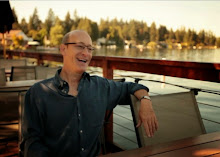We all have patterns.
Some would say the patterns are inherent, but I'm kind of a fan of free will. I believe we choose the patterns that suit us, within the limitations imposed by heredity and environment.
Doesn't matter for the point I'm making here. What matters is that once you become your own person, what you do, and what is done to you, can be expressed so simply, it can fit on a tombstone.
Take your mother. Someday, if she dies before me, I'm going to make her a bench instead of a headstone. She loves places to sit, and one of her charming idiosyncrasies is that if she's given $1,200.00 to furnish a room, she'll spend $1,100 on a couch and two chairs. Even if the room already has a couch and two chairs.
The bench is going to be hewn by hand from a single slab of the heaviest stone I can find. Because your mother appreciates the hand made. And because whenever we would travel, she managed to find the heaviest, most cumbersome souvenir she could. In San Jose del Cabo it was a pulpit made of timbers that must have originally been used to support the roof of a cathedral. In Mazatlan she found a concrete rain god. When we went to Turkey, we brought back not just two very heavy wool rugs, but probably 50 pounds of glass.
I'm going to place the bench in the most remote, isolated place I can find. Because your mother loved both surprises and helping people. A surprise that would help people would be the best gift she could give for eternity, even if was only a comfortable place to sit in the last place you'd expect to find one.
But what the epitaph goes on, and where the thing the epitaph goes on is placed, are totally distinct from the epitaph itself. It's the difference between style and substance, both of which define a person.
What goes on your mother's bench, out there in the wilds of Patagonia, are the words, "I think I see the trail picking up again."
There's a story behind those words.
Your mother and I once went out to Lake Arrowhead for the weekend with my cousin Shari and some of her friends. One afternoon, we went for a hike.
Actually, it was a walk. Into the woods. With no preparation, no maps, no compasses, no water, no food, and no idea what we'd run into. After a while, the trail started to become a bit, well, thin. We could have turned back, but your mother forged cheerfully ahead.
Hours later, it was too late to turn back. We had no idea where we were and any bare patch of ground might have been the "trail." We were surrounded by trees and brush, with no obvious way to proceed. And it was getting dark.
Your mother shimmied under a fallen tree--one that had clearly been down for decades--shoved her way through a clump of bushes, and disappeared. And that's when I heard her voice, cheerful as ever: "I think I see the trail picking up again."
That, in a sentence, is your mother.
Where others see despair, she sees hope. Where others expect failure, she expects success.
In this case, just like every other case, she was right. When I got under the tree and through the brush, I didn't see a trail. None of us did. But somehow, following her, we managed to get back to the car.
I'm showing off now, but I can give you a couple more examples. Your grandfather's tombstone should say, "As I say." Because if he lives long enough for you to know him, you will discover that what drives him--what absolutely defines him--is his need to be known for knowing.
As for your Uncle Sterling, I can't tell you the epitaph, but I can tell you that the dates will be wrong. And knowing him, he'll probably have four or five graves so that one set of friends won't accidentally run into another set of friends if they happen to decide to pay their respects on the same day.
Your grandmother will have a really nice plot with a lovely view, but she'll be facing the wrong way. And her headstone will say something to the effect of, "See? I knew this was a lousy spot." Twenty years after being buried, she'll be proved right. The cemetery will wash away in a flood or toxic chemicals will be discovered leaching into the soil.
And what about me? I don't really want a headstone, so it's hard to imagine an epitaph. But if there is one, it's probably something really clever, really profound, and not quite complete.
Thursday, February 26, 2009
When you really know a person, you can write his or her epitaph.
Labels:
accumulated wisdom,
life lessons,
meaning of life,
perspective,
wisdom
Subscribe to:
Post Comments (Atom)




No comments:
Post a Comment